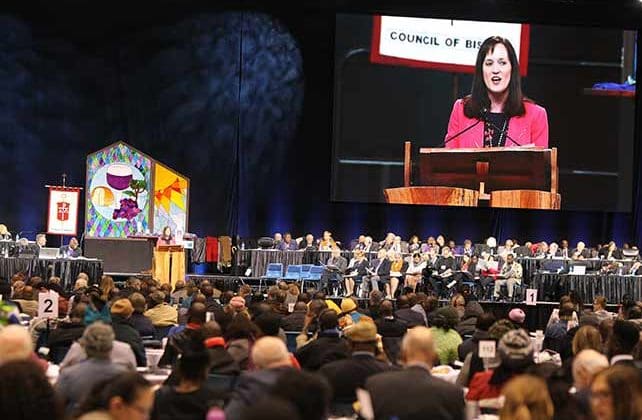
(RNS) The United Methodist Church has once again postponed its quadrennial meeting due to the COVID-19 pandemic, delaying further a widely anticipated vote by delegates from across the globe on a proposal to split the denomination over the inclusion of LGBTQ members.
The United Methodist Church General Conference now is scheduled for Aug. 29 to Sept. 6, 2022, at the Minneapolis Convention Center in Minneapolis.
In the meantime, the denomination’s Council of Bishops has called a special session of the General Conference that will meet May 8, 2021, online.
“Our current Book of Discipline was never written with a worldwide pandemic in mind,” Bishop Cynthia Fierro Harvey, president of the Council of Bishops, said in a written statement about the special session.
“When we became aware of the need for a further postponement, we knew that some action needed to be taken in order to free the church to operate and continue to fulfill its current mission until we could gather in person.”
This is the second time the United Methodist Church, one of the largest denominations in the United States, has rescheduled the meeting of its top decision-making body, which will gather 862 delegates and other United Methodists from around the world.
The quadrennial meeting had originally been set for May 5 to 15 of last year, also in Minneapolis. That meeting was rescheduled for Aug. 29 to Sept. 7, 2021, when the Minneapolis Convention Center announced it was restricting events.
Delegates to the General Conference are expected to take up a proposal to split the denomination called “A Protocol of Reconciliation and Grace Through Separation.” The proposal, negotiated by 16 United Methodist bishops and advocacy group leaders from across theological divides, would create a new conservative “traditionalist” Methodist denomination that would receive $25 million over the next four years.
Calls to split one of the largest denominations in the United States have grown since the 2019 special session of the United Methodist General Conference approved the so-called Traditional Plan strengthening the church’s bans on the ordination and marriage of LGBTQ United Methodists.
The Commission on the General Conference made the latest decision to reschedule the General Conference at its meeting on Saturday (Feb. 20), according to the denomination. Commissioners decided they were not able to assure full participation of all General Conference delegates, who travel from across the globe, in either an in-person or a virtual meeting.
The pandemic remains a threat as COVID-19 cases continue to rise, and a vaccine is not expected to be widely available this year in many countries, the denomination noted. New variants of the virus, including one originating in South Africa, also have been reported.
The denomination also considered how the pandemic complicates travel for delegates from outside the U.S. International travelers to the U.S. must show proof of negative COVID-19 test results, but testing is not free or readily available in many places. Visa services also remain limited in some places.
The Commission on the General Conference explored the possibility of holding the meeting virtually, as much of life has been lived online during the past pandemic year. However, a Technology Study Team report laid out a number of issues with a such a meeting, including a lack of infrastructure and technology in some places, concerns about credentialing and verifying the identity of voters and the security of voting.
The study team did suggest delegates could use mail-in ballots to vote on emergency actions, according to the denomination.
The use of paper ballots would allow for the “fullest” participation of delegates, according to Harvey.
The 2021 special session will be limited to voting on measures to allow the use of such mail-in ballots, according to the Council of Bishops.
That, in turn, will allow delegates to vote on 12 pieces of legislation that will allow the denomination to “continue its administrative functions appropriately” until the postponed meeting in 2022. The legislation includes measures related to retirements and extending the last approved budget to the next general conference meeting.
It does not include measures related to the proposal to split the denomination, which Harvey said in a written statement should be reserved for an in-person meeting “where debate, amendment, and discernment could be conducted with integrity and full participation.”
“Full participation on the part of all elected delegates is a justice issue that must not be ignored or sacrificed,” the bishop said. “This is why the convened session online must be confined solely to gaining permission for the mailed in paper ballots.”
